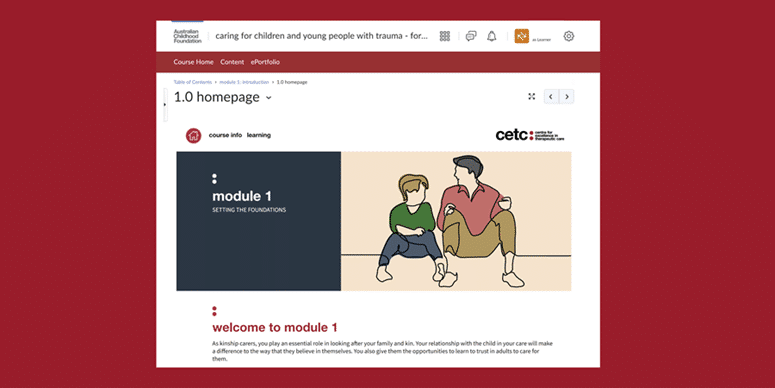Trauma-informed care connects to children’s needs; trauma-informed carer training should connect to carers’ needs
Mar 2023
Written by Billy Black
The CETC is thrilled to announce our new online course “Caring for Children and Young People with Trauma” is now live and free for all South Australian kinship and foster carers! Developed in partnership with the South Australian Department for Child Protection, this self-paced course is an interactive look at the foundations of trauma-informed care, with demonstrative case studies, interactive quizzes, and inspiring video talks from real carers, therapists, and psychology experts.
Foster and kinship carers need quality training and an established support network before it’s needed, not offered reactively to challenges as they develop. Training in trauma-informed care helps carers understand and empathise with children’s behaviours, keep calm in their chaos, and focus on building a life-changing relationship with a very special child. Support needs to come not only from family and friends but the whole Care Team: the social workers, teachers, counsellors, birth family – everyone who comes together to wrap support around the child.
Unfortunately, the busy schedules and demands of care make it difficult for carers to access or attend training. Additionally, training often tries to cover all care types despite the different needs of foster and kinship carers, or for those caring for our Aboriginal and Torres Strait Islander children. Even when carers can attend training, content that focuses on meeting children for the first time or managing cross-cultural placements can feel alienating to kinship carers, who often view themselves as “just Grandma”, a carer only by technicality.

Despite fast-growing support for kinship placements in the care system, foster carers continue have better access to training and support services than kinship carers, and those opportunities are still designed primarily with foster carers in mind (Harding, Murray, Shakespeare-Finch, & Frey, 2020). Kinship carers also often become carers during a family crisis, with no preparation or training for this life-changing role (McPherson & Macnamara, 2014).


References
Australian Institute of Health and Welfare (2021). Child Protection Australia: Children in the Child Protection System. Cat. no. CWS 75. Canberra: AIHW. https://www.aihw.gov. au/reports/child-protection/child-protection-australia-children-in-thechild-protection-system
Duerr Berrick, J. & Hernandez, J. (2016). Developing consistent and transparent kinship care policy and practice: State mandated, mediated, and independent care. Children and Youth Services Review, 68, 24-33 https://doi.org/10.1016/j.childyouth.2016.06.025
Harding, L., Murray, K., Shakespeare-Finch, J., & Frey, R. (2020). The well being of foster and kin carers: A comparative study. Children and Youth Services Review, 108, 104566
Hartnett, P., Dawe, S. & Russell, M. (2012). An investigation of the needs of grandparents who are raising grandchildren. Child and Family Social Work, 19(4), 411-420.
McPherson, L. & MacNamara, P. (2014). Therapeutic kinship care: A carer’s perspective’. Children Australia, 39(4), 221-5.
Scott, D, & Swain, S. (2002). Confronting Cruelty: Historical Perspectives on Child Protection in Australia. Melbourne: Melbourne University Press.
Winokur, M.A., Holtan, A. & Batchelder, K.E. (2018). Systematic Review of Kinship Effects on Safety, Permanency and Well Being Outcomes. Research on Social Work Practice, Vol; 28(1) 19-32 https://doi.org/10.1177/1049731515620843


